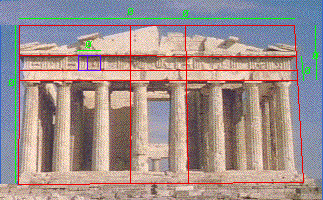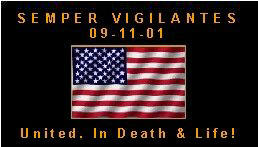|
|
 The
VigilanceVoice The
VigilanceVoice

VigilanceVoice.com
v
Sunday-- February 24, 2002—Ground
Zero Plus 166
The Character of Courage
Vigilance For Our First Thought
by
Cliff McKenzie
Editor, New York City Combat Correspondent News
GROUND ZERO, New York City,
Feb. 24--"Such then is the character of true courage...Though it never
provokes danger, (it) is always ready to meet even death in an honorable
cause."
When I first heard these words I
thought they were spoken by some modern man or woman, reflecting on the
disaster of the World Trade Center, or the battle against the Taliban.
The words are 2300 years old, spoken
by one of humanity's great teachers--Greek Philosopher Aristotle.
He searched for truths about human
nature--seeking ways in which we might understand who we are, and what our
true values might be--especially in the mad rush to become civilized.
Even back two millenniums ago, the
same problems plagued people--fear, intimidation and complacency.
Reading Aristotle today is as though he were alive, sitting in your
living room, sharing his viewpoints as though he just stepped off the F
Train and strolled up Second Avenue to enjoy a cup of coffee with you at
Starbucks.
The "Golden Years" of life--what we
might think today as a modernism--was a key factor in Aristotle's
thinking. He pointed to the age of 50 as the mid-point of
life, where youth's enthusiasm, passion and innocence crossed over to
benevolence, pessimism and restraint.
The "Golden Mean," he suggested, was
a form of balance between one's expectations and life's reality.
It was a goal, to learn to think in ways that would turn fear into
courage, intimidation into conviction, and complacency into action.
In today's struggle with
Terrorism, the lesson's that Aristotle taught need some dusting off.
How do we acquire courage, conviction and take actions when we are so busy
with our lives that we find it difficult to comprehend these words as part
of our daily routine?
The first step is to recognize
they exist--one side of the equation rules us by accident. Fear,
Intimidation and Complacency are primal genes that seem to appear suddenly
in our psyche when triggered by some physical event, or some mental
(emotional) feeling. They sweep over us like tidal waves, or stalk
us like assassins of the soul, waiting to send us to our knees thinking we
are "helpless," or "victims," or "unable to resist" their power.
I saw a woman crying her heart
out on the streets the other day. She had her face buried
against a building, her body wracked in sobs. Her tears rain-dropped
to the cement--blood drops of her tortured soul.
I wanted to provide solace but
I knew I wasn't responsible for her demons. I would feed them
by assuaging her. I would be just a Band-Aid.
Earlier, on the subway, a man
and woman sat drugged out, heads against one another, their minds numbed
by some depressant that suffocated responsibility to life. I took
their picture and as I framed it in the digital camera, I wondered how
life's beauty had turned on them with such violence that they dug their
grave in life, and zipped it over their heads. Two lost souls,
anesthetized to life.
Terror shrieks silently sometimes.
It is easy to address the Terror of a September 11th when the world is
crushing around you. That kind of fear is easy to ferret out,
to isolate, to treat. But the inner emotional fear of life itself is
not so easy to track. The soul covers its footsteps, hides the
demons in dark corners that leap out unexpectedly.
I learned a long time ago that I
wasn't responsible for my first thought, but I was my second thought.
One's first thought--those demons which raise their ugly head from deep
within the caves of fear, intimidation and complacency--can only be fought
on the home front by the person who thinks them.
The U.S. Marine Corps' new
Anti-Terrorism Task Force cannot rush in and lay waste to one's thoughts.
The neighborhood of the mind cannot be patrolled by Vigilant Sentinels of
Security, ambushing the mind's shadows.
But the principle of "First
Thought-Second Thought" can. If I know my First Thought can
rise out of the bowels of my human inadequacy and create in me a sweeping
sense of fear, intimidation or drive me to a state of complacency, I can
be responsible for my Second Thought.
I can say to myself, "Stop Thought."
I can put up red lights in my mind, and hear the screeching of breaks on
those feelings, emotions and uncontrollable angsts that could turn a day
of beauty into a day of horror as I let those thoughts eat holes in my
soul.
"You're not good enough!" "Nobody
likes you!" "You're not loved." "Nobody cares about
you." "You aren't lucky." "You're not pretty enough, smart
enough, worthy enough."
Haunting First Thoughts of all your past
sins of life, your character defects, your pains and struggles can surface
in the blink of an eye and drive you to the wall crying, or seeking some
drug to smother the pain, or drive you to a state of emotional isolation
where you hide and furtively glance at the world going by.
Terrorism of the First Thought can be as
desperate a state as watching Terrorists fly airplanes into World Trade
Centers, or seeing a speeding car bearing down on you.
 |
|
The Parthenon =
Phi = Divine Proportion= The Golden Mean |
Aristotle's Golden Mean was all about
balance.
The Greek philosopher sought to teach us to
neutralize the First Thought by being responsible for the Second
Thought--by turning the fear into courage, the intimidation into
conviction, and replacing complacency with action.
It meant we had the courage to blink.
To stop and realize that the moment of NOW is the key. To stop
and suck in a breath of air and thank the heavens we are alive, we are
human, that we have hope, however thin the threads of it may seem.
"Such then is the character of true
courage...Though it never provokes danger, (it) is always ready to meet
even death in an honorable cause."
These ancient words apply today.
The honorable cause Aristotle spoke about is the recognition of our human
worth to change from within. If we can see the world in
balance, and not dwell on the fears or past defects, we have a chance to
face the present, and the future.
It comes down to us dealing with our Second
Thought--what do we have to be hopeful for right now? What is
life to us this minute, not in reference to the past flaws, or past pains,
but now, as though we were newborns?
Terrorism of the soul, of the heart, of the
being, is a far more insidious danger than anything Osama bin Laden can
bring to us with bombs and bullets.
That's why we must search through the
events of September 11 to find the value within its horror. To
me, that value was to bring to life the Sentinels of Vigilance.
These are the guardians of the First
Thought, the strong warriors of the mind and soul who throw up the Shields
of Vigilance and yell at us to protect ourselves from the dangers of the
First Thought, by being courageous enough to stop the thought, and convert
it, transfigure it into a Second Thought--a Thought of Balance.

|
When
we are unhappy, we seek to find something happy to neutralize
the unhappiness. When we are sad, we seek to find something
we are glad for, or about. When we feel helpless
and inadequate, we go into action, perhaps smiling at someone,
or picking up litter off the street, or stopping to smell a
rose. We enrich rather than destroy the life we have.
We remember the Sentinels
of Vigilance. They rose out of the waste of September
11 to give us a reason to live, a purpose for understanding
Terrorism both without and within. Now it is our job to
honor those who died for us by taking responsibility for our
Second Thoughts.

Go
To Feb. 23--Vigilance and The Marines Anti-Terrorism Brigade
©2001
- 2004, VigilanceVoice.com, All rights reserved - a ((HYYPE))
design

|
|






